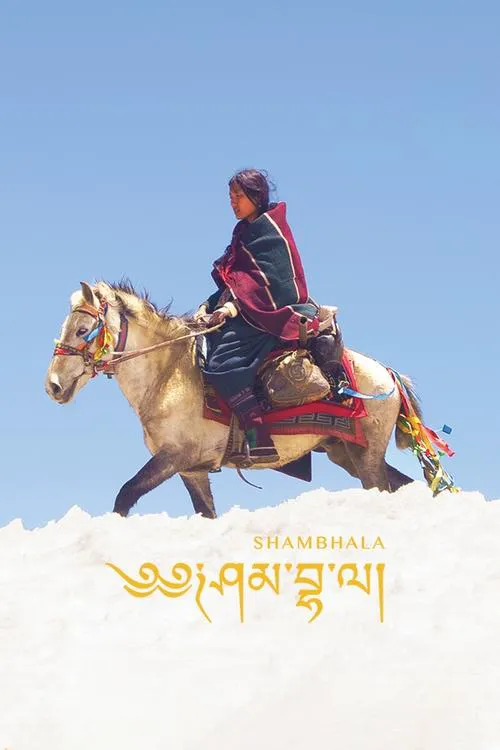シャンバラ

あらすじ
ヒマラヤの息を呑むような風景を舞台にした、高い評価を得ている映画『シャンバラ』は、希望、喪失、そして自己発見の忘れられない旅へと観客を誘う。 映画は趣のあるネパールの村で幕を開ける。そこでは、複婚家族の若い花嫁であるペマが、新しい生活に適応しようと苦労している。当初は不安を感じるものの、愛情深い夫たちと家族に囲まれ、ペマの喜びは明らかだ。しかし、彼女の至福は長くは続かない。最初の夫タシが遠く離れた都市ラサへの旅で行方不明になるのだ。ペマが育った村はタシの失踪に動揺し、かつては平和だった雰囲気は心配と期待に満ち溢れる。 ペマの苦悩に心を動かされた、知識が豊富で思いやりのある尼僧の夫、カルマは、タシを探すために過酷な荒野を通る危険な旅に同行することを申し出る。二人は危険な山の道、荒れ狂う川、厳しい気候条件を乗り越え、危険な旅に出発する。過酷な地形を横断するにつれて、妊娠しており最初の夫の喪失に対処しようとしているペマは、孤立感と孤独感についてカルマに心を開き始める。 山奥へ進むにつれて、ペマとカルマの関係は僧侶同士の絆から深く永続的な友情へと発展する。精神的な導き手であり仲間でもあるカルマは、ペマが恐れ、不安、欲望に立ち向かうのを助け、ゆっくりと確実に、彼女は自分の強さと回復力を発見し始める。この映画は、互いに頼り合い、その過程で自分自身を見つける、この二人の登場人物の共生関係を美しく捉えている。 彼らの探求は、当初はタシを見つけたいというペマの願望に駆り立てられていたが、徐々に精神的な旅へと変貌していく。カルマはペマにチベット仏教の古代の教えを紹介し、彼らの共有された経験を通して、彼女は思いやり、相互のつながり、そして人生の儚さの真の意味を理解し始める。過酷な荒野の現実に向き合うにつれて、ペマは新しい目で世界を見るようになり、彼女の視点は恐怖と不確実性から勇気と希望へと変化する。 映画の撮影は息を呑むほど美しく、ヒマラヤの生の美しさと雄大さを捉えている。カメラワークは綿密で、長回しを使用することで、観客が見事な風景に没頭できるようになっている。ネパールの文化、複婚家族の伝統、そして自然界の美しさに対する細部へのこだわりは驚くべきものだ。 ペマとカルマが目的地に近づくにつれて、彼らは危険な嵐、間一髪の脱出、そして彼らに導きとサポートを提供する仲間の旅行者との出会いなど、一連の試練と障害に遭遇する。彼らの共有された経験を通して、ペマはタシと、かつて知っていた人生への執着を手放し始め、ゆっくりと確実に、彼女は新しい目的意識とアイデンティティを発見し始める。 最終的に、ペマの旅は自己発見と解放の深い瞬間に至り、そこで彼女は自分の道を切り開き、自分のために新しい人生を創造する勇気を見つける。映画は希望に満ちた結末を迎え、ペマは力を得て自信に満ち溢れ、シャンバラへの壮大な旅で学んだ教訓を胸に、人生の新しい章を始める。シャンバラは、チベットの伝説の主題となってきた神話上の楽園だ。 見事な映像、魅力的なキャラクター、そして示唆に富むテーマを持つ『シャンバラ』は、エンドロールが終わった後も長く観客の心に残る作品となるだろう。ヒマラヤの雄大な景色を背景にしたこの美しく映像化された物語は、人間の精神が持つ回復力、希望、そして変革の能力の証である。
レビュー
Sadie
Most of the short reviews really just confirm what Yuan Shen said: many people today have lost the ability to process complex texts. It's like directly copying views on Tibetan Buddhism. Ontological or typological criticisms are just ways of seeing. Even the film is just a means. The key is perception, the heart, faith, not thinking. Of course, you can think if you want, but when you take the film to the European market, besides cultural exchange, isn't it also about selling it? This is the highest-budget film ever made in Nepal; doesn't the director have a responsibility to the investors? Why don't you criticize the fact that every shot in *Heat* has Mount Fuji in it? That's just what Nepali villages look like... what's wrong with that?
Brooklyn
A profoundly anthropological film... polyandry, a small society, mechanical solidarity, Buddhist beliefs... After the screening, I chatted with the director, jokingly saying the film felt very anthropological and would be perfect for our department. Turns out, the director is actually pursuing a PhD in anthropology! (Amazing...) As we were leaving, he asked if we wanted to grab a drink, and we eagerly agreed. So, we ended up having drinks with the director, who made Nepal's first film to be selected for Berlinale, and also chatted with the director whose short documentary is nominated for a Golden Horse Award this year...
Zoey
#HKAFF2024# Quite a long film, I dozed off towards the end.
Josiah
3.5 Unlike Pema Tseden, Nepalese-Tibetan cinema completely avoids the issue of modernization and possesses its own intrinsic logic. Matters of faith point to the past, while issues of true love point to the present.
Quinn
The snow mountains are breathtakingly beautiful. For a pregnant woman to trek such a long distance across the high plateau and only spot blood without miscarrying, she must also have the EPAS1 gene mutation; this definitely aligns with the phenomenon of Tibetans soon dominating all (extreme) sports. How does polyandry translate into several times the housework and emotional labor? Damn, where's the sense in that? I support Pema going solo.
おすすめ



